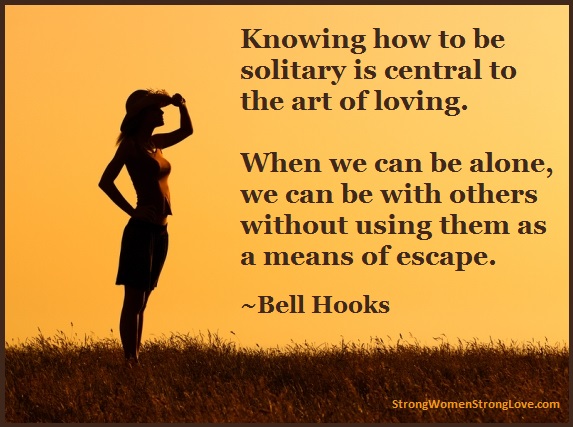by Strong Women Strong Love | May 15, 2016 | Persistent Pressures, Principal Priorities |

We all fall prey to it sometimes: The feeling that we should do more, be more, have more. We all face pressure to be ‘living large.’
Maybe you succumb to it when your sister asks what you’re doing to help your teen get into a high-ranked college. Or when your friend shares pictures on Facebook of the dream vacation your family can’t quite afford. Maybe photos of beautiful decors on Pinterest have you looking at your own house with critical eyes, or an upcoming class reunion makes you wish you had more career successes to brag about.
There’s nothing inherently wrong with any of those pursuits, of course. The problem comes when we start chasing such goals without even asking ourselves whether we truly want them and how much they will truly cost us.
How might the stress of trying to “go big” in every area of your life affect you? Could the high expectations that go with pursing all these goals possibly take a toll on your marriage?
‘I Am Not Enough. There Is Never Enough.’
What turns our expectations for ourselves from a source of motivation to a source of stress? Well, some common beliefs in the United States have something to do with that tendency.
In her book, The Trance of Scarcity: Stop Holding Your Breath and Start Living Your Life, coach and speaker Victoria Castle writes that most of us living in American culture have internalized the story: I am not enough. There is never enough.
If that story is something you feel at your core, nothing will be enough to fill that sense of lack. You’ll be constantly heaping new expectations on yourself.
Then there’s our culture’s belief that you can do anything you set your mind to. The simple truth we often ignore, though, is that everyone has physical, emotional and financial limits. Your energies and resources are not infinite.
Now throw in the push to compare ourselves with others thanks to the never-ending barrage of images on social media. “Why does it look so easy for everyone else?” we wonder. And then we push ourselves even harder.
Feelings of scarcity, a belief that we should be limitless, and constant comparisons with others are a perfect recipe for ongoing stress.
And as you already know, being stressed only makes a marriage harder. When both of you constantly feel pressured to keep up with outside standards, it really makes it harder to keep the focus where it needs to be — on each other.
Is It OK to ‘Live Small?’
You may think that the happiest marriages are between people who have somehow figured out how to do it all and have it all. Not true.
Instead, the most satisfied couples get clear on what’s important to them. They step away from external pressures that don’t fit the life they want to create. And they make their marriage a priority, even when taking time for their relationship means they have to let go of some of the things they’re supposed to do or have (but that ultimately aren’t as important to them).
These couples haven’t escaped from pressure and expectations. But they can better weather them because their relationship gives them a strong center. And they don’t necessarily have tiny, circumscribed lives. The difference is they respect their limits and get added support when they need it.
Think about the expectations you put on yourself and where they come from. Do they stem from your own desires, or do they feel more like what you have to do to be “good enough”? Do they leave you energized and fulfilled, or stressed and emptied? And how do they affect your marriage? Whether you live smaller or larger, make sure your life truly reflects your most important priorities, and remember these wise words:
“If you don’t make time to work on creating the life you want, you’re eventually going to be forced to spend a LOT of time dealing with a life you don’t want.” -Kevin Ngo
by Strong Women Strong Love | May 1, 2016 | Passionate Partnership, Personal Power |

As women, we’re constantly bombarded with messages about the importance of being attractive. Constantly.
Usually, those messages center on our appearance. How many times have you seen advice about how to get a “bikini body,” dress to seduce or “turn back time,” so you can look younger?
The hope is that if you do these things, you won’t have any trouble stoking the fires of attraction and keeping them burning, right?
Right, if you want a short-term, purely physical attraction. Wrong, if you’re trying to create the kind of attraction that lasts a lifetime.
So what can make you attractive to your husband decade after decade? Hint: Getting a new haircut or wearing sexy lingerie might be nice, but probably won’t turn his head forever.
Let me give you a formula to try (and it doesn’t require starving yourself, getting a personal stylist or undergoing cosmetic procedures).
(SELF-WORTH + RELAXED AUTHENTICITY) + LOVING ACTION = IRRESISTIBLE ATTRACTION
Here’s why that formula works — and why it doesn’t mention a bikini body.
The truth is that if you’re feeling desire wane in your marriage, it’s probably not because your husband’s physical attraction to you has decreased dramatically.
What’s going on instead is likely a decline in the emotional connection between the two of you. Because we often rely heavily on our partners to get our emotional needs met (that’s especially true of men), the nature of that emotional bond is critical.The deep attraction that sustains a marriage isn’t about what catches your eye in the club or on a dating app. It depends on two very important things: having a strong sense of self AND creating a loving connection with your husband.
- STRONG SELF: It’s important to have a sense of self separate from your partner. That’s why the first part of the formula is about you — valuing yourself, being comfortable in your own skin, treating yourself as if you matter, and letting your husband know what you need. It’s about engaging what truly makes you feel alive, showing up as yourself, and drawing a line when others don’t respect you. It’s being playful, confident, and engaged in your own life. As therapist Esther Perel has so eloquently noted, distance, space, and mystery stoke the fires of attraction. Be yourself, enjoy doing your own thing, and you’ll amp up the attraction in your relationship. If you’re not convinced, ask yourself how attracted you would be to your husband if he was really needy and had no life outside you! Not much, I bet.Remember the wise words of Dr. Harriet Lerner:
Being your strongest and best self will give your relationship the best chances of succeeding. Having a clear and courageous voice is NOT a recipe for divorce, unless your partner truly has no commitment to you, or can only tolerate an overly-accommodating partner.
- LOVING ACTION: How you interact with your husband is also a huge part of whether he feels attracted to you. Most of us love to be around someone who makes us feel good about ourselves — someone who likes us and is good to us. When you treat your partner in ways that let him know you want him, that he matters to you, and that you’re glad he’s in your life, he’s going to be a whole lot more interested in you! For real intimacy to develop in a marriage, we have to cultivate emotional safety, deep understanding, and presence on a regular basis. No one is going to open up if you’re distracted or if they’re worried you might criticize them. Let your actions show that you revere your spouse, and watch him become more vulnerable, trusting, and irresistibly drawn to you.
Try out my attraction formula, and let me know what happens. You can also learn about keeping a strong connection with your husband even during with a busy, overscheduled lives in my book Strong Women, Strong Love.
by Strong Women Strong Love | Apr 17, 2016 | Poisonous Patterns |

We all know couples who seem to bicker and spar all the time. Maybe you’re even part of a couple like that yourself.
Does constant conflict mean that a marriage is in trouble? My answer here might surprise you.
Through my work with many, many couples, I’ve seen that the frequency of your arguments with your spouse is much less important than the way you fight.
In fact, Dr. John Gottman, one of the leading researchers on marital happiness, says that how you manage conflict in your relationship is the most important factor in determining whether you stay married.
Gottman isn’t saying that your goal should be a conflict-free marriage. And neither am I. All couples disagree from time to time, and there’s nothing wrong with that. When you sweep issues under the rug in hopes of avoiding an argument, that just breeds resentment and hurts your relationship in the long run. Venting complaints in a constructive way clears the air and strengthens your bond.
So how do you do that?
Avoid the ‘Four Horsemen’
First, you have to steer clear of a few behaviors that can make conflicts devastating to your marriage. Gottman refers to these as the “Four Horsemen” because their constant presence in a relationship accurately identifies couples most likely to end up divorced. We all slip into these behaviors sometimes, but beware of letting them become a pattern when you argue with your spouse.
- Defensiveness. Conflict becomes toxic when partners deny responsibility, make excuses or counterattack.
- Criticism. Don’t attack your spouse’s personality or character; instead, stay focused on the specific problem.
- Stonewalling. Some people shut down in a conflict because they are trying not to “make things worse.” Ironically, stonewalling often has the opposite effect.
- Contempt. Showing contempt is the absolute worst thing you can do during an argument with your spouse. Insulting your husband in front of others, rolling your eyes and mocking can all quickly damage your relationship.
Follow the Rules for Fighting Fair
Now that you know the “danger zones” to avoid during your next argument, here are a few tips to strengthen your bond, even when you’re in conflict:
- Time it right. Don’t bring up issues when you are tired, irritated or feel like you can’t control yourself — or when you can tell that your husband is experiencing one of those states.
- Get close. Pause, hold hands and make eye contact when you’re disagreeing. When you are in touch with the humanity of your partner, you’ll be less likely to hurt each other.
- Choose your words wisely. The first few moments of your interaction set the tone for what comes next. You know your husband better than anyone else does — which means you probably know exactly what to say to wound him deeply. No matter how angry you are, exercise restraint and remember that your words have power. A few mean-spirited words in the heat of the moment can haunt your relationship for a long time.
- Pause. Ask for time to calm down if you need it, but keep in mind that you do still need to come back and address the issue.
If you’re too upset during your next argument to recall anything else from this article, just remember that the key word is “respect.” When you maintain respect with each other during a conflict, you keep your relationship on solid ground. If you’d like more advice on fighting fair in your relationship, you will find an entire chapter devoted to the topic in my book Strong Women, Strong Love.
by Strong Women Strong Love | Apr 3, 2016 | Passionate Partnership, Poisonous Patterns |

One single word can be the source of many different troubles in marriage: Expectations.
We all have them. There’s no way to avoid them. But it’s how we handle them that can make or break our marriages.
What kind of expectations do you have of your husband? Is he meeting them, or are you constantly disappointed? if you’re often feeling let down or resentful, it’s important to take a closer look at your expectations.
“Shoulds” and “shouldn’ts” provide clues that expectations are present. Do any of these “shoulds” sound familiar?
- He should want to make me happy.
- I shouldn’t have to tell him what I need. He should be able to see it.
- He should want to be a better man.
- He should take care of me when I’m tired or sick.
- He should tell me that he thinks I’m beautiful.
- He should thank me for all the work I do.
- He should want to spend his spare time with me.
- We should share the household tasks 50/50.
- We shouldn’t have to work so hard at being in love.
- He should tell me what he’s thinking and feeling without my constantly having to ask him.
Expectations can cause problems if you’re not careful. When expectations are not clearly communicated or they are unrealistic, the marriage can suffer.
It’s easy to cling to the idea that our spouses should “just know” what we expect of them. You might think your husband should automatically understand how you want your birthday celebrated, tune into your emotions when you give a hint of distress, or jump in with extra help when you’re busy with the kids. When he doesn’t, it’s easy to feel very hurt and assume he doesn’t care.
Instead of complaining, being sarcastic, dropping clues, or shutting your husband out, be sure to use these strategies:
- Ask for what you need. Therapist and relationships expert Terrence Real says, “You have no right to complain about not getting what you never asked for.” If you don’t communicate your expectations, there’s a chance your husband doesn’t know how important they are to you — which makes him less likely to act in the way you want him to. Don’t resort to ineffective ways of communicating to make it known how dissatisfied you are. Instead, own your needs and your responsibility to communicate them. Be direct, be respectful, and be ready to negotiate for what you need.
- Be realistic. A recent study found that high expectations can actually lead to a more satisfying marriage, but only when those expectations can actually be met. Are your expectations based on the husband you actually married or the one you wish you’d married? Is he capable of doing what you’re expecting of him? For example, if he grew up in a family where no one talks about feelings, how likely is it that he will effusively and automatically tell you about what’s going on with him emotionally? Or, if he’s always been someone who lives in the moment, what are the odds that he will be planning the details of your future together? Set your expectations in line with what’s most likely to happen, not what you wish would happen.
- Ease up. Remember to cut each other some slack on your expectations, especially when you’re stressed. Sometimes temporary barriers such as a work deadline, an illness, or too little time together can make it unlikely that expectation can be met at that time.
Keeping your marriage healthy amid the demands of everyday life takes constant maintenance, communication and compassion. Most of all, it requires being realistic. Make sure your expectations fit the person you’re married to and the reality of your lives together so you can set your marriage up for success, not failure.
by Strong Women Strong Love | Mar 14, 2016 | Passionate Partnership |

Relationships are never in neutral mode.
Everything that each one of you does in your marriage is either building it up or tearing it down. Every action, every day counts. It’s not just what you do on anniversaries or other special occasions that affects the quality of your relationship. It’s what happens when you’re rushing around in the morning, unwinding at the end of the day or in any of those easy-to-overlook moments that have more meaning than we realize.
You can use those moments for some on-the-spot nurturing of your relationship. These ideas don’t take much time, but they have a big impact.
- Greet your husband warmly when you see each other after work.
- Don’t forget a quick peck when you say goodbye.
- Make a big deal out of it when he tells you about some good news from his job.
- Put down your phone when the two of you are talking.
- Notice how he contributes to your relationship or to your family and compliment him on it.
Behaviors like these strengthen your bond. But when you don’t practice them, it’s hardly a “no harm, no foul situation” — you’re undermining your relationship through neglect.
And then there are the active behaviors that damage your relationship. Even if they happen in passing, they set dangerous patterns.
- Rolling your eyes or showing contempt in other ways.
- Failing to show the same courtesies you’d practice with a friend.
- Saying something shaming about him (even if you’re “teasing”), especially while the two of you are around friends or family.
- Micro-managing the household tasks he does.
- Ignoring him when he seeks your attention because you’re busy with work or the kids.
This week, pay attention to how you and your husband interact every day and how your behaviors might affect the long-term health of your relationship. Any positive changes you can make, no matter how small, can make a real difference as they start to add up. You can also find more practical strategies for keeping your marriage thriving even when you’re both stressed and busy in my book Strong Women, Strong Love.
by Strong Women Strong Love | Feb 29, 2016 | In the News, Poisonous Patterns |

I don’t know you, but I’m willing to bet that both you and your husband have an extramarital involvement that’s affecting your relationship.
I’m not talking about other people (or at least I hope that’s not happening!). I’m talking about your phones.
There’s even a name now for ignoring your partner so you can pay attention to your phone: Pphubbing (partner phone snubbing).
And researchers are starting to look at the effect of pphubbing on relationships. Two marketing professors from Baylor University published a study on the phenomenon last fall.
“What we discovered was that when someone perceived that their partner phubbed them, this created conflict and led to lower levels of reported relationship satisfaction,” James A. Roberts, one of the researchers, explained in a news release about the study. “These lower levels of relationship satisfaction, in turn, led to lower levels of life satisfaction and, ultimately, higher levels of depression.”
As Sherry Turkle, a professor at MIT and the author of Alone Together put it in a 2012 TED Talk, we’re prone to using technology to hide from each other or keep each other at arm’s length.
So how can you keep your phone from coming between you and your spouse?
First, pay attention to whether you’re engaging in any of the behaviors that participants in the Baylor study identified as pphubbing:
- Placing your cell phone where you can see it or keeping it in your hand when you’re with your partner.
- Glancing at your cell phone when you’re talking with your partner.
- Checking your cell phone during lulls in conversation with your partner.
See what happens when you commit to avoiding those behaviors and being more present with your partner.
To keep your phone use from affecting your relationship, you may also have to look beyond your personal habits. It’s not your imagination that demands on our time are greater than ever before — and our employers’ constant access to us via our phones is part of the reason why. If it’s possible in your work situation, try to set some stronger boundaries. For example, let colleagues know that they should call you instead of texting or emailing if something urgent comes up so that you won’t feel compelled to keep checking your messages. You could even work together with your colleagues to try to change your office’s communication culture so that all of you can get more restorative time away from work.
Finally, remember that your phone isn’t inherently good or bad for your relationship. It all comes down to how you use it. So as you look for ways to curb your pphubbing behaviors, also look for ways to use technology to enhance communication with your partner. In our busy lives, it’s easy for couples to put deeper communication on the back burner as your conversations become limited to what needs to get done that day (“I have a late meeting, so you’ll need to pick up the kids after soccer — oh, and did you call the bank like we talked about?”). Using technology to add some moments of connection — for example, sending a sweet (or sexy!) text message or sharing an article you know your husband will like with him on Facebook — doesn’t take much time but has big payoffs on the overall health of your relationship.
We get the most from our relationships we give our full attention to each other. Don’t let the siren’s call of your phone imperil that. You’ll find more ideas on staying connected in our busy lives in my book Strong Women, Strong Love. You can even read it on your phone — just not while your partner is talking with you
by Strong Women Strong Love | Feb 15, 2016 | Poisonous Patterns |

Uh-oh. It’s happened. Your husband has crossed one of the non-negotiable lines with you. He’s shown disrespect in a way you just won’t tolerate, whether that’s cursing at you, raising his voice in public, or another boundary-pushing behavior.
What do you do now?
Your first instinct when your husband crosses the line might be to strike back or run off. If you can, don’t do either one of these things. Try a more measured approach that is actually more effective in the moment and better for your relationship in the long term:
- Express your boundary calmly and clearly.
- Let him know you expect him to do better.
- Move on.
Before you do anything, take a deep breath and see if you can get calm and clear headed. Otherwise, your message won’t be as powerful.
When you’re ready, look your husband in the eye and let him know that the behavior he’s engaging in is one you absolutely will not tolerate: “Cursing at me under any circumstances is completely unacceptable. I would never do that to you.” Things will probably be a little intense during this initial confrontation because you are drawing a crystal clear boundary. Be calm, firm, and clear.
Next, set a positive expectation. Tell your husband that you expect better from him. You may want to say something like “I know you are better than that” or “That wasn’t the guy I married.” Choose words that work for your situation and your relationship, but hold open the possibility that he can be more respectful.
Then, move on, and give him some space. You want to be short, sweet, and to the point. Lengthy explanations usually just confuse the issue.
With a little time and space to reflect, most men will eventually feel sorry for crossing the line. If your husband sincerely apologizes, forgive him, but keep a watchful eye until you’re convinced he will not cross the boundary again.
If your husband shows no remorse about crossing the line, or worse, acts self-righteous about it, you may have a bigger problem on your hands. Although we are talking here about actions that go beyond everyday slip-ups, more dire and complex behaviors like addiction and physical or emotional abuse are good reasons for seeking professional assistance.
If you tend to fear conflict, all of this can be a little scary to undertake — even though you know in your gut that it’s the right thing to do. It may help to remember that taking a stand is ultimately the best thing for your relationship and for establishing the baseline for respect. Disrespect is something that simply cannot take root in your relationship if you want it to remain healthy. Research clearly shows that contempt is the No. 1 predictor of divorce.
A firm, clear and quick response can help keep problems from escalating when your husband crosses a line. You can learn more about constructive ways to argue or deal with trouble spots in your relationship in my book Strong Women, Strong Love.
Don’t forget to subscribe to receive new blog posts HERE and get a free report, “10 Easy Ways to Get Him to Listen.”
by Strong Women Strong Love | Jan 31, 2016 | Passionate Partnership |

What’s the most romantic thing you can do for your husband this Valentine’s Day? Planning a special dinner? Choosing the perfect gift?
Those gestures are wonderful, of course, but the most powerful thing for your marriage might actually be showing your excitement when he tells you he aced a presentation at work or that he hit his exercise goal for the month.
Recent research highlights the value of celebration, positivity and enthusiasm in creating a happy relationship. That might seem intuitive, but it’s something we often overlook. We tend to talk about the strength of a relationship in terms of how a couple weathers challenges or hard times together. But the way we handle the “for better” part of “for better or for worse” is just as important.
A UCLA study found that the way dating couples discussed positive events was more closely related to the health of their relationships than how they talked about negative events. Another study discovered that sharing good news with someone else and getting an enthusiastic response enhances the value of the good news to the sharer and strengthens the relationship with the responder.
And just last year, a brain-imaging study added more evidence for the power of positivity. New York Magazine’s Science of Us blog describes the study as showing that “the relationship satisfaction of longtime married elderly women is particularly related to the neural activity they show in response to their husbands’ displays of positive emotion, rather than negative emotion” and notes the possibility “that marital happiness goes hand in hand with sensitivity to our partners’ positive emotion.”
How can you use these findings to strengthen your own relationship? Christine Carter of UC Berkeley’s Greater Good Science Center recommends remembering to share your own good news with your partner and reacting with enthusiasm when he shares good news with you. The key word here is “enthusiasm.” A distracted “that’s nice, Honey” just doesn’t have the impact of genuine interest and excitement. We all have an innate need to be “seen” and cherished by the people who are important to us. When that happens in a relationship, the bond between partners strengthens. Also remember that all the seemingly little positive and negative things you do in a relationship add up over time. Responding enthusiastically when your partner has good news is a great way to make a “deposit” in the emotional bank account of your relationship — and ensure that you’re ready for any “withdrawals” in difficult times.
To learn more about infusing your relationship with positivity, check out my book Strong Women, Strong Love. And don’t forget to throw in a few high fives (figurative or literal!) for your husband amid all the hearts and flowers of Valentine’s Day.
by Strong Women Strong Love | Jan 18, 2016 | Persistent Pressures |

Have you and your girlfriends ever mused together about how “the male brain” only processes information about sports, sex and food? Or maybe you’ve heard comedians joke about how “women’s brains” have endless room for remembering men’s slip-ups so they can throw them back in their faces someday?
While the idea of brain differences between men and women has found its way into pop culture wisdom, it has actually long been an area of controversy among researchers.
A study released late 2015 casts new doubt on whether brains can be male or female.
Researchers led by Daphna Joel of Tel Aviv University published the study “Sex beyond the genitalia: The human brain mosaic” in the journal Proceedings of the National Academy of Sciences.
The researchers looked at the MRI exams of more than 1,400 men and women. Based on what they found, they concluded that “human brains cannot be categorized into two distinct classes: male brain/female brain.”
There are indeed gender differences in brains and behaviors, according to the study, but most of our brains are “comprised of unique ‘mosaics’ of features, some more common in females compared with males, some more common in males compared with females, and some common in both females and males.” Brains with characteristics that are purely “male” or “female” are rare.
The new research supports what I argued in my book Strong Women, Strong Love. In the book, I explained that, yes, there are some common ways that men behave and that women behave, but those aren’t the only ways. Research shows that there are more differences within groups of men and within groups of women than between the sexes. In other words, you can’t say that all men or all women do a certain thing. The behaviors you might blame on your husband’s “male brain” are more likely due to the messages he received growing up about what it means to be a man.
Perhaps the most important thing to remember, though, is that whether a person’s behavior is caused by a brain characteristic or what he or she learned from others, it’s always possible to learn new ways of being. After all, recent brain research has also demonstrated the power of neuroplasticity, the brain’s ability to change in response to our experience.
How would you rate your own brain? Does it seem more female, more male or — as the researchers described most of the brains they studied — more of a “mash-up”? Share your thoughts in comments or on my social media channels.
by Strong Women Strong Love | Jan 2, 2016 | Quotes |

Knowing how to be solitary is central to the art of loving.
When we can be alone, we can be with others without using them as a means of escape.
~Bell Hooks











